“I think music is a fantastic way of empowering people and giving them strength and energy. I’ve spent a good part of my life trying to find and write music that will empower people to resist and stand up for what’s right.” -Anne Feeney in the Pittsburgh Post-Gazette April 24, 2008.
In 2021, a collection of letters, photographs, tapes, and political T-shirts were donated to the Heinz History Center. The items belonged to the late Anne Feeney, a powerhouse musician and activist who called Pittsburgh her home.
Feeney, who passed in 2021 due to complications from COVID-19, was a lifelong union warrior who used music to rally troops on picket lines and inspire political change. Her business cards described her as “Performer, Producer, Hellraiser”, and her folk songs displayed a devotion to justice by crusading for workers’ rights, peace efforts, and environmental change.
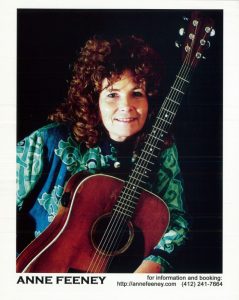
Publicity Photograph of Anne Feeney. Anne poses with her guitar for a publicity shot. Credit: Senator John Heinz History Center, Anne Feeney Collection, MSS 1246.
Anne was raised in Brookline and steeped from the start in a family legacy of coal mine work and political activism. Her grandfather, William P. Feeney, traveled to America from Ireland at the age of fourteen. In America, he worked as a coal miner, representative in the Pennsylvania General Assembly, and was an active union organizer.
William’s heritage was a heavy influence on Anne and was made only greater by the fact that he worked with Mother Jones, one of her great heroes. Today, Anne rests in the same cemetery as Mother Jones, the Union Minors Cemetery, which represents a significant honor and was her desired burial site.
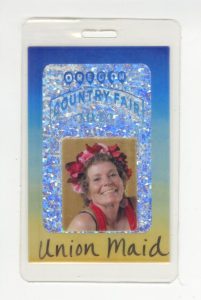
Oregon County Fair Badge, c. 2012. Anne Feeney’s County fair badge shows her with a crown of flowers. Below her name is written her nickname, “Union Maid”, harkening to her work with unions in Pittsburgh and throughout the nation. Credit: Senator John Heinz History Center, Anee Feeney Collection, 2012, 2021.98.
Feeney took this early education in advocacy to her time at the University of Pittsburgh where she achieved her bachelor’s and law degrees. As a Pitt student (and teenager) Anne played her first public performance at a Vietnam War protest. Her choice of song? A tune from renowned protest singer Phil Ochs.
In addition to penning fiery tunes, Feeney served as a trial lawyer for twelve years, assisting survivors of domestic violence and refugees. She was a NOW (National Organization for Women) chapter president, a delegate to the Central Labor Council, and the only women ever elected President of the Pittsburgh Musicians Union as of 2022. As president of PMU, one of Feeney’s projects was to organize a women’s history event titled “Professional Women in Music.”
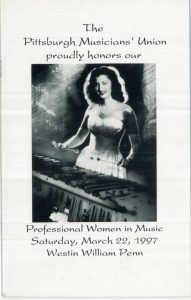
Front Cover of Program for “Professional Women in Music” Event, 1977. This is the program cover for Anne’s Women’s History event. The event featured musicians such as Regina Peterson, a singer who performed at USO shows and Pittsburgh’s night clubs. Credit: Senator John Heinz History Center, Anne Feeney Collection, 1977, MS 1246.
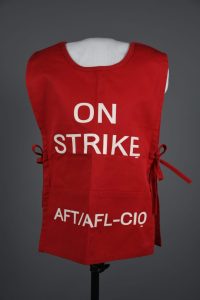
AFT/AFL-CIO Strike Vest, c. 2000. This red strike vest belonged to Feeney and showed her support for the American Federation of Teachers. Credit: Senator John Heinz History Center, Anne Feeney Collection, 2021.98.
Her work was a necessary outpouring of the passion which flowed through her music. Feeney’s songs had a specifically political nature. In conversation with her children, Amy Sue and Dan Berlin, who donated the collection to the museum, Amy discussed her mother’s reverence for music with a message. According to Amy, Anne believed that if you have the privilege of an audience in front of you, music should be used to influence this audience.
It was this devotion to radical revolution which made Feeney’s songs so popular and so powerful. Her most iconic tune, “Have You Been to Jail for Justice?”, was popularized by Peter, Paul, and Mary. She toured North America and Europe and was invited to play at events such as the 1986 Great Peach March and the 1989 March for Women’s Lives.
Anne Feeney’s philosophy of art as a catalyst for change is one which was also present in an underground, yet widespread community of young women in the nineties. In the same city where Feeney was traveling to strikes with her guitar in tow, teenage girls were creating and distributing ‘zines, band recommendations, and new ideas about what it meant to be a young woman. They were the Riot Grrrls.
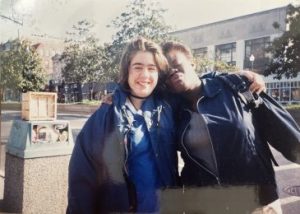
Two Riot Grrrls, 1990s. Two Riot Grrrls pose at a Riot Grrrl Conference in Washington, D.C. At conferences, young people could meet other Riot Grrrls and attend workshops. Credit: Courtesy of Sara McCool Alexander.
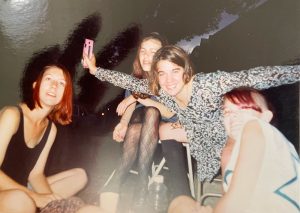
Riot Grrrls, 1990s. Four Riot Grrrls pose together at a Riot Grrrl Conference in Washington, D.C. Credit: Courtesy of Sara McCool Alexander.
Riot Grrrls was a feminist, punk movement which connected teenage girls across the country and birthed a creative counterculture of music and protest. Born in Olympia, Washington, the Riot Grrrls originated with a group of women seeking to push back against sexism in the punk scene and create a more accessible space for women musicians. The term ‘girl’ was infused with extra r’s to invoke an angry, confident snarl.
The Riot Grrrl scene was notable for its accompanying DIY culture. Riot Grrrls created ‘zines, short for magazines, to discuss issues which affected their day-to-day life. Some of these included sexism, racism, and LGBTQ+ rights. To create ‘zines, Riot Grrrls cut and pasted together magazine pages, photographs, artwork, personal writing, and news articles. ‘Zines became a public, confessional space where young women could share and process their trauma.
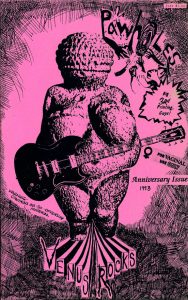
Cover of Pawholes Issue Three, 1993. This bright, pink cover of the ‘zine Pawholes shows the Venus of Willendorf, a 30,000-year-old fertility or women goddess symbol, carrying a guitar. The cover also warns readers of “oh-so-offensive material.” Credit: zinewiki.com, 1993.
Pittsburgh’s Riot Grrrls produced ‘zines such as Sourpuss by Sara McCool Alexander, “Busy Bea’s Bush” by Nicole Emmenegger, and “Pawholes” by Deborah Barkun and Keren Kurti. The Pittsburgh Riot Grrrl scene was a relatively smaller community compared to places like Olympia, but those involved were no less invested. Headed by Sara McCool Alexander, Pittsburgh Riot Grrrls gathered in public arenas such as the Beehive Coffeeshop to create flyers, coordinate concerts, and converse together.
Inspired by what could be described as the Riot Grrrl anthem, “Rebel Girl” by Bikini Kill, the members began their own rebellious revolution. Sara and Nicole recalled organizing a protest outside a local Hooters which involved recruiting protesters at their high school and standing outside the establishment with signs. The Pittsburgh Riot Grrrls also partnered with organizations such as Food not Bombs, Rock for Choice, and the Carnegie Mellon University Women’s Center.
Despite representing extremely different genres, Anne Feeney and the Riot Grrrls both weaponized music to empower marginalized communities. Whether it was the forthright lyrics of Anne’s folk melodies or the rollicking drumbeats of the Riot Grrrl band, begging young girls to take their place at the front of the room, these two show the powerful influence music can wield.
To view the Anne Feeney collection, researchers can visit the Detre Library & Archives at the History Center. The University of Pittsburgh also houses the William P. Feeney collection donated by Anne Feeney.
If you have material relating to the Riot Grrrls or women in Pittsburgh’s Rock Music scene, we would love to hear about it!
By: Alicia Method, Heinz History Center Curatorial Intern